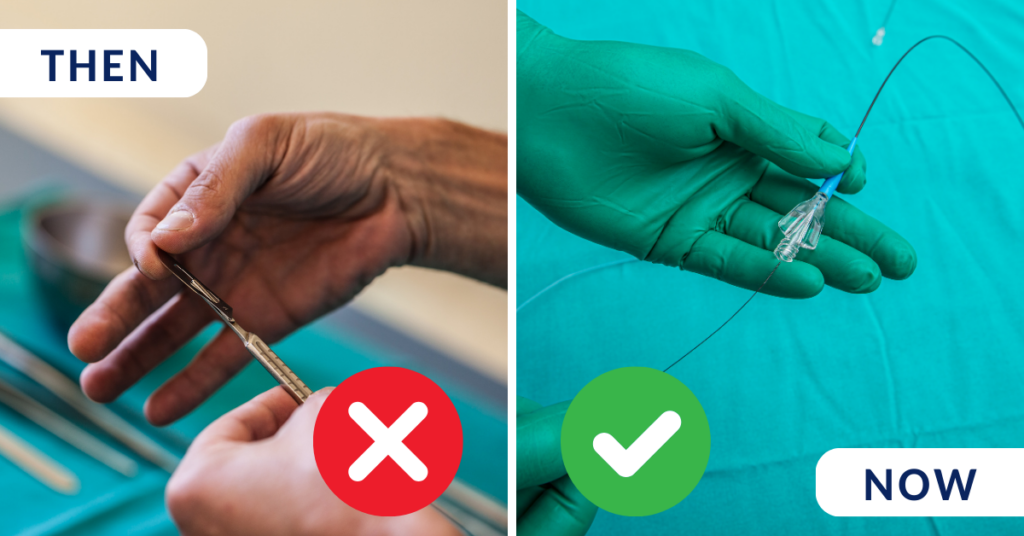Imagine a world where invasive surgeries are the exception, not the rule; where the scalpel is replaced by a catheter, offering innovative, minimally invasive solutions that are safer, quicker, and relatively pain-free.
This is not the opening scene from a futuristic sci-fi movie or an episode of “Black Mirror” – thanks to interventional radiology, it is the future of medicine.
Interventional Radiology is an ever-evolving specialty that is revolutionizing patient care with incredible benefits. Utilizing advanced imaging equipment and techniques, we’re making the once unthinkable – targeted diagnoses and treatments with minimal risk or trauma – a reality.
What is Interventional Radiology?
Interventional Radiology (IR) is a medical specialty characterized by the use of image-guided procedures to diagnose and treat diseases in nearly every organ system. This specialty represents a significant shift in modern medicine, leveraging cutting-edge technology and minimally invasive techniques to provide solutions that were previously only possible through traditional, more invasive surgeries.
The beauty of this specialty is its ability to deliver precise treatments with reduced risk and recovery time compared to traditional surgery. It’s like using a sniper rifle instead of a shotgun – targeting only the problem area, causing less damage to surrounding tissues, and speeding up recovery. This approach reduces procedural time and improves patient outcomes, making it a game-changer in the medical field.
“Today, interventional radiology is synonymous with modern medicine,” says the Society of Interventional Radiology (SIR)
The Tools of the Trade: Imaging Modalities
Just like a painter uses different brushes for different effects, interventional radiologists use various imaging modalities, each of which serves a specific purpose. Some of the most commonly used tools include:
- X-ray fluoroscopy is like a real-time GPS, guiding instruments during procedures.
- CT scans create 3D blueprints of your body, showing cross-sectional images that help diagnose diseases and guide biopsies.
- MRI is invaluable for soft-tissue contrast, helping to detect tumors or other anomalies.
- Ultrasound is the Swiss Army knife of imaging. It is versatile, safe, and used for everything from vascular access to biopsies and treatment.
Diagnosing with Precision
The goal of interventional radiology, when it comes to diagnostics, is to identify and analyze a body’s problem areas in a way that is faster, safer, and less invasive than open surgery. Using a combination of the tools we discussed above, IR doctors can capture detailed images of the body’s inner structures – a viewpoint that was once inaccessible without exploratory surgery or other more invasive techniques.
Interventional radiology doctors can use these techniques to diagnose a wide range of conditions. Angiography, for instance, allows us to spot blockages or narrowing in blood vessels, helping detect conditions like peripheral artery disease. Similarly, image-guided biopsies can identify tumors or infections, all without the need for open surgery.
Plus, IR doesn’t stop at diagnosis – it also allows for minimally invasive treatments like atherectomy (a peripheral intervention that opens arteries blocked by plaque) or embolization (used to treat conditions like BPH, fibroids, and more), offering a one-stop solution for patient care.
The Benefits Are Innumerous!
Interventional Radiology procedures have many benefits, including quick, targeted diagnosis and treatment, less risk and discomfort, and faster recovery than traditional surgery. It’s also outpatient-friendly, reducing healthcare costs and long hospital stays, thereby minimizing disruption to patients’ lives.
Plus, most of our procedures can be performed under light sedation (reducing the risk of anesthetic complications) and completed, start-to-finish, on average, in 90 minutes or less!
However, it’s important to note that not every condition or patient is suitable for endovascular interventions. So, if you’re battling a health condition that’s impacting your day-to-day life, talk with your doctor today about your options!
The Future Looks Bright
Interventional Radiology is revolutionizing the landscape of modern medicine, providing targeted, minimally invasive diagnoses and treatments with more precision than ever before. As technology continues to evolve, the possibilities for this field are as exciting as they are endless.
If you or a loved one are curious about what IR solutions might be available to you, check out our website! There, you’ll find a wealth of information about the conditions we treat, procedures, and community impact. Together, we can look forward to a brighter, healthier tomorrow!
ECCO Medical 8080 Park Meadows Drive, Suite 150 Lone Tree, CO 80124 (720) 668-8818




